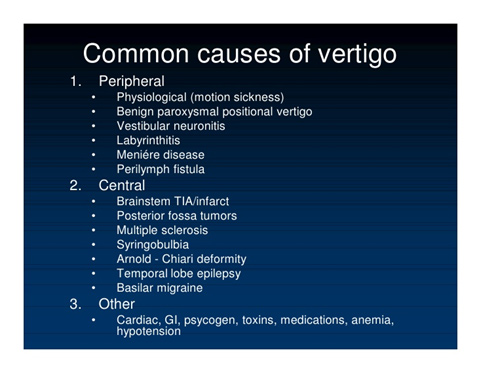Causes of Dizziness

Common Causes of dizziness with presenting symptoms
| Disorder | Tempo | Symptoms | Circumstances |
|---|---|---|---|
| Vestibular neuritis | Acute dizziness | R Vertigo, disequilibrium, nausea and vomiting, oscillopsia | Spontaneous, exacerbated by I head movements |
| Labyrinthitis , | Acute dizziness | Vertigo, disequilibrium, nausea and vomiting, oscillopsia, hearing loss and tinnitus | Spontaneous, exacerbated by head movements |
| Wallenberg’s infarct | Acute dizziness | Vertigo, disequilibrium, nausea and vomiting, lateroPulsion, ataxia, crossed sensory loss, oscillopsia |
Spontaneous, exacerbated by I head movements |
| Bilateral vestibular deficit or >7 days from a Unilateral vestibular defect | Chronic dizziness | Dizzy, disequilibrium, occasionally oscillopsia | Induced by head movements, walking. Exacerbated when I walking in the dark or on uneven surfaces |
| Mal de debarquement | I Chronic dizziness J | Rocking or swaying as if on a boat | Spontaneous while lying or sitting Rarely occurs while in motion |
| Oscil1opsia | Chronic dizziness S | Subjective illusion of visual motion | Spontaneous with eyes open |
| Anxiety/depression ‘ | Chronic dizziness | Lightheadedness, floating, or rocking | Induced by eye movements with head still |
| Benign paroxysmal positional vertigo | Spells: seconds | Vertigo, lightheadedness, nausea | Positional: lying down, sitting up or turning over in bed, bending forward |
| Orthostatic hypotension | Spells: seconds | Lightheadedness | Positional: standing up |
| Transient ischemic attacks | Spells: minutes | ‘Vertigo, lightheadedness, disequilibrium” | Spontaneous |
| Migraine . | Spells: minutes | , Vertigo, dizziness, motion sickness | Usually movement-induced |
| Panic attack | Spells: minutes | Dizziness, nausea, diaphoresis, fear, palpitations, paresthesias | Spontaneous or situation |
| Motion sickness | Spells: hours | Nausea, diaphoresis, dizziness | I Movement induced, usually vlsuovestibular mismatch |
| Meniere’s disease | Spells: hours | Vertigo, disequilibrium, ear “ fullness from hearing loss and tinnitus ‘ | Spontaneous, exacerbated by head movements |
Common symptoms of dizziness and Mechanisms or systems involved
| Symptoms | Mechanism |
|---|---|
| Disequilibrium: imbalance or unsteadiness while standing or walking | Loss of vestibulospinal, proprioception, visual, and/or motor function, joint pain or instability, and psychological factors |
| Lightheadedness or presyncope | · Decreased blood flow to the brain |
| Sense of rocking or swaying as if on a ship , (mal de debarquement) | Vestibular system adapts to continuous, passive motion and must ! readapt once environment is stable Anxiety |
| Motion sickness | Visuo-vestibular mismatch |
| Nausea and vomiting | Stimulation of medulla . |
| Oscillopsia: illusion of visual motion | Spontaneous: acquired nystagmus Head-induced: severe, bilateral loss of the vestibulo-ocular reflex |
| Floating, swimming, rocking, and spinning inside of head (psychologically induced) | Anxiety, depression, and somatoform disorders I |
| Vertical diplopia | Skew eye deviation I |
| Vertigo: rotation, linear movement, or tilt | Imbalance of tonic neural activity to vestibular cerebral cortex |
Quick Reference to Causes of dizziness.
AG Kerr FRCS (Ann Acad Med Singapore, 2005;34:285-8)
| Pathology of Vertigo | |||
| Sensation of rotation | |||
| Episodic | Seconds | Stimulation or depression of the labyrinth | |
| Hours | Metabolic of biochemical failure of the labyrinth | ||
| Prolonged | Weeks | Destructive lesion of the labyrinth | |
| Sensation of unsteadiness | |||
| Episodic | Seconds | Physiological overload of the vestibular system | |
| Hours to days | Temporary impairment of the vestibular system | ||
| Prolonged | Weeks to months | Vestibular inadequacy | |
| Main Causes of Short-lived Rotatory Vertigo (duration: less than 1 minute, usually about 20 seconds) |
|||
| Benign positional vertigo, Labyrinthine fistula, Caloric effect, Vertebrobasilar insufficiency |
|||
| Main Causes of Longer Episodic Rotatory Vertigo (duration: ¼-24 hours, usually a few hours) |
|||
| Meniere’s disease, Delayed endolymphatichydrops, Syphilitic labyrinthitis Decomposition of a previously compensated vestibular lesion, “Vestibular-Meniere’s disease” |
|||
| Main Causes of Prolonged Rotatory Vertigo (duration: up to 3 weeks) |
|||
| Vestibular neuronitis | |||
| Trauma | Accidental | Head injury Ear surgery |
|
| Planned | Labyrinthectomy Vestibular nerve section |
||
| Labyrinthitis | Bacterial or viral | ||
| Vascular lesions of the labyrinth | |||
| Metastaitic deposits in Cerebello-Pontine angle | |||
| Main Causes of Short-lived Unsteadiness (duration: less than 1 minute, usually a few seconds) |
|||
| Rapid head movements – especially post-concussion | |||
| Abnormal input | Visual (including heights), Cervical | ||
| Minor inadequacies | Visual Vestibular Proprioceptive |
||
| Main Causes of Longer Episodic Unsteadiness (duration: from hours to days) |
|||
| Drugs ×Self-inflicted ×Iatrogenic Motion sickness Perilymph fistula Active chronic suppurative otitis media Decompensation of previously compensated lesion Hyperventilaton Psychogenic |
|||
| Main Causes of Prolonged Unsteadiness (duration: weeks to months, even years) |
|||
| Aging Drugs ×Metabolic effect (reversible) e.g., anticonvulsants ×Destructive effect (irreversible) e.g., ototoxic antibiotics CNS lesions ×Parkinsonism ×Multiple sclerosis ×Vascular disease ×Tumours Floating patient Active chronic suppurative otitis media |
|||


